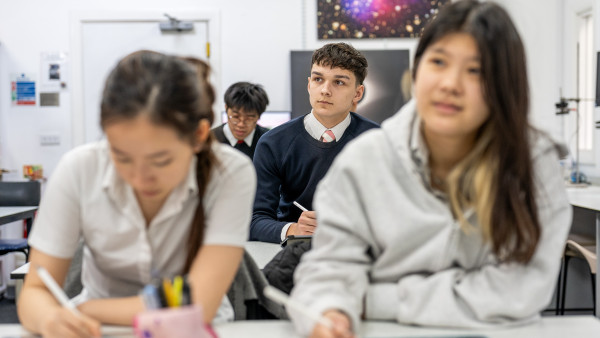MGS provides exceptional opportunities for very able boys from a wide range of backgrounds. Great results of course, but by no means an exam factory - this is a school where talents of all kinds are nurtured and it’s ok to be different. With good facilities and an absolute focus on learning and academic excellence, any boy with ability and the drive to excel will thrive here.
Why read our school review?
Unlike other websites, schools can't pay to be included in The Good Schools Guide. This means our review of this school is independent, critical and fair, and written with parents' best interests at heart.
Unlock to accessOverview & data
- Pupil numbers
- 1,660 ·
- Sixth form numbers
- 420 ·
- Religion
- None
- Fees
- £18,666 pa
- Local authority
- Manchester City Council
- Linked schools
Headteacher
High master
Dr Martin Boulton
High master since 2013, Martin Boulton, BSc, PhD. Was a sixth form pupil at MGS under the assisted places scheme and went on to study engineering at the University of Nottingham. From there he worked first for mining company De Beers and then
Unlock this review instantly
Learn what pupils and parents really think of this school, along with our expert opinion on the headteacher’s leadership style, the school’s academic results and facilities, the focus on pastoral care, and the range of extra-curricular activities.
Entrance
In year 7 boys sit an assessment day and take an entrance examination. The assessment day includes a maths lesson, a topic activity and group activities all of which are based on work not previously covered to ensure a level playing field for all. On
- Open days
- September, November and May
Exit
School says that 'almost all' year 11 boys stay for the sixth form, but for some reason would not tell us numbers of leavers or where they go. In 2025, 32 Oxbridge offers and 41 offers for medicine or dentistry. Imperial, UCL, LSE, Durham, Warwick,
Latest results
In 2025, 73 per cent 9-8 at GCSE; 73 per cent A*/A at A level (93 per cent A*-B).
A levels or equivalent - Average points score (2024)
What is this?
These figures tell you the average grade and average points that pupils achieved in their academic qualifications. A maximum of 60 points are available for a grade A* at A level.
Teaching & learning
MGS undoubtedly lives up to its motto,'Sapere aude' (Dare to be wise). There is a real love of learning here and the boys we met were clearly driven to succeed. One told us, ‘You are constantly challenged to be your best here and everyone is
- Qualifications taken in 2024
- A level
- EPQ
- GCSE
Learning support & SEN
Around 200 boys (14 per cent of school population) on the SEN register, surprisingly high given the ability profile of the school. Very strong support for pupils with ASC and ADHD. SENCO has over 30 years' experience at MGS, 18 of those leading SEN
Arts & extracurricular
Modern, well-equipped professional standard theatre with dedicated technician. Pupils put on six shows a year, many are student led and the lack of girls is no barrier, as shown by a recent all-male version of Daisy Pulls it Off (wish we'd seen it).
Sport
High quality sports facilities including an enormous gym, state of the art Mike Atherton sports hall, endless playing fields, multi gym for year 9 upwards, all-weather hockey pitch and tennis courts as well as access to the nearby University of
Ethos & heritage
Founded by bishop Hugh Oldham in 1515, for gifted boys to study ‘the science of grammar’ regardless of background or wealth. Originally site was next to Manchester Cathedral and the school moved to its current location in Fallowfield in 1931. It
Pastoral care, inclusivity & discipline
Parents and boys speak very highly of pastoral care which is based around form tutors and year heads. ‘We couldn’t believe how nurturing the school is compared to where he came from,’ a parent enthused. One boy told us, ‘It’s incredible how they look
Mobile phone policy
A clear mobile phone policy is a really important part of modern schooling. This school has provided us with their policy.
Mobile phone policy
Pupils in years 3-6 must not use mobile phones during the school day. Pupils in years 7-11 must not use mobile phones during the school day except during a 10-minute window to make transport arrangements. Sixth form pupils must not use mobile phones during the school day except during break and lunch time.
Pupils & parents
Boys come from a very diverse mixture of families. Some on bursaries are from Manchester postcodes with high levels of deprivation while others are from well off professional families, travelling in from Cheshire as well as across the Manchester
Money matters
Bursary scheme is funded mostly by old boys. At the time of our visit around 200 pupils were in receipt of the full bursary which includes payment of bus fares and provision of a laptop. Academic trips are also paid for as well as one of the big
- Fee information
- £18,666 pa
The last word
MGS provides exceptional opportunities for very able boys from a wide range of backgrounds. Great results of course, but by no means an exam factory - this is a school where talents of all kinds are nurtured and it’s ok to be different. With good





